Dopar Dopamine 200mg Injection
$90.00 – $240.00Price range: $90.00 through $240.00
| Pack Size | Price | Price / Unit | Quantity | |
|---|---|---|---|---|
| 5 Injections | $90.00 | $18.00/ unit | ||
| 20 Injections | $240.00 | $12.00/ unit |
Looking for bulk / B2B pricing? | Send Inquiry |

| SKU | 11416 |
| Manufacturer | Samarth Life Sciences Pvt Ltd |
| Categories | Injections |
| Delivery Time | 10 - 14 Working Days |
| Strength | 200mg |
Introduction to Dopar Dopamine 200mg Injection
Dopar Dopamine 200mg Injection is a prescription medication primarily used in emergency and critical care settings. It is administered under the supervision of healthcare professionals to manage various medical conditions that require rapid cardiovascular support or stabilization during acute situations.
This injectable formulation comes in a sterile vial and is intended for intravenous use. It is typically given in a hospital environment, where the patient can be closely monitored. The dosage and rate of administration depend on the specific medical condition and the patient’s response to the treatment.
Dopar Dopamine 200mg Injection is often included in intensive care protocols and emergency response therapies. It is used in scenarios such as shock or low blood pressure when immediate intervention is necessary. The treatment must be tailored carefully to the patient’s vital parameters.
Uses of Dopar Dopamine 200mg Injection
Dopar Dopamine 200mg Injection are primarily used in medical settings to address specific conditions related to cardiovascular function and blood pressure regulation. Here are some common uses of Dopar Dopamine 200mg Injection:
- Treatment of Shock
- Acute Heart Failure
- Low Blood Pressure (Hypotension)
- Improving Renal Perfusion
How Does Dopar Dopamine 200mg Injection Works?
Dopar Dopamine 200mg Injection works by stimulating specific dopamine receptors in the body, which leads to increased heart rate and improved contraction of the heart muscles. This enhances cardiac output, making it especially useful in treating conditions like shock and acute heart failure.
Additionally, it acts on adrenergic receptors, which helps constrict blood vessels and elevate blood pressure. It can also improve blood flow to the kidneys in low doses, supporting urine output and kidney function in critically ill patients. Its effects vary depending on the dosage and patient’s condition.
Side Effects of Dopamine
Dopar Dopamine 200mg Injection, when used as a medication, can have various side effects. The severity and occurrence of these side effects can depend on factors such as the dosage, the individual patient’s response, and the specific medical condition being treated. It’s essential for healthcare professionals to closely monitor patients receiving Dopar Dopamine 200mg Injection and adjust the dosage as needed. Here are some potential side effects associated with Dopar Dopamine 200mg Injection administration:
- Headache
- Nausea or vomiting
- Irregular or rapid heartbeat (tachycardia)
- Chest pain
- Anxiety or nervousness
- Shortness of breath
Dosage of Dopar Dopamine 200mg Injection
The dosage of Dopar Dopamine 200mg Injection is individualized based on the patient’s condition, weight, and response to treatment. It is typically administered as a continuous intravenous infusion, starting at low doses (2 to 5 mcg/kg/min) and gradually adjusted under close medical supervision.
Higher doses (up to 20 mcg/kg/min or more) may be used in severe cases, such as profound shock or advanced heart failure. The infusion rate is carefully monitored to maintain optimal blood pressure, cardiac output, and kidney perfusion while minimizing potential side effects or complications.
How To Manage Side Effects?
- Close Monitoring
- Adjust Dosage
- Use of Antidotes
- Supportive Care
- Electrolyte Balance
- Renal Function Monitoring
Warning & Precautions
Dopar Dopamine 200mg Injection is a potent medication with significant cardiovascular effects, and its use requires careful consideration of warnings and precautions. Healthcare professionals must assess the patient’s overall health and the specific medical condition before initiating dopamine therapy. Here are some important warnings and precautions associated with dopamine injection:
- Dopar Dopamine 200mg Injection should only be used in a clinical setting under the supervision of qualified healthcare professionals due to its potent cardiovascular effects and the need for constant monitoring.
- Use with extreme caution in patients with heart conditions, including arrhythmias or recent myocardial infarction, as precise dosing and monitoring are critical to avoid complications.
- The injection must be diluted properly before use and administered through a controlled intravenous infusion pump to ensure accurate dosing and prevent overdose.
- Patients with pre-existing vascular diseases, such as atherosclerosis or Raynaud’s phenomenon, should be closely monitored due to the potential for compromised blood flow.
- The solution should be inspected visually before administration; discolored or cloudy solutions or those with particulate matter should not be used.
- Special caution is required in patients with endocrine disorders like pheochromocytoma, as dopamine may provoke unwanted systemic responses in such cases.
- Avoid abrupt discontinuation of the infusion; dosage should be tapered gradually to prevent sudden drops in blood pressure or cardiac output.
Storage
- Store Dopar Dopamine 200mg Injection at a controlled room temperature between 20°C to 25°C (68°F to 77°F).
- Protect the vial from light and freezing to maintain its effectiveness.
- Keep the injection in its original packaging until ready for use to prevent exposure to light.
- Do not use the solution if it appears discolored, cloudy, or contains particles.
- Once diluted and prepared for infusion, use the solution promptly and discard any unused portion.
- Keep out of reach of children and dispose of expired or unused medication properly, following hospital or local guidelines.
Frequently Asked Questions
1. Can Dopar Dopamine 200mg Be Given With Other Medications?
Ans. Yes, Dopar Dopamine 200mg is often used alongside other medications in critical care. However, drug compatibility must be reviewed by healthcare providers to avoid any adverse interactions.
2. How Long Can Dopar Dopamine 200mg Be Infused?
Ans. The duration of Dopar Dopamine 200mg infusion depends on the patient’s condition and clinical response. It may range from a few hours to several days and is continuously adjusted by medical staff.
3. Where Can I Buy Dopar Dopamine 200mg Online Safely?
Ans. Dopar Dopamine 200mg should only be purchased through licensed pharmacies. You can inquire about its availability from trusted sources like Damson Pharmacy, which specializes in hospital-use medications.
4. Can I Use Dopar Dopamine 200mg At Home?
Ans. No, Dopar Dopamine 200mg is strictly for hospital use due to its potent cardiovascular effects and the need for constant monitoring during infusion. Self-administration or use outside a medical facility is not advised.
| Pack Size | 10 Injections, 20 Injections, 5 Injections |
|---|---|
| Price/Unit | $12/unit, $15/unit, $18/unit |
Be the first to review “Dopar Dopamine 200mg Injection” Cancel reply
Related Products
No related Products Found

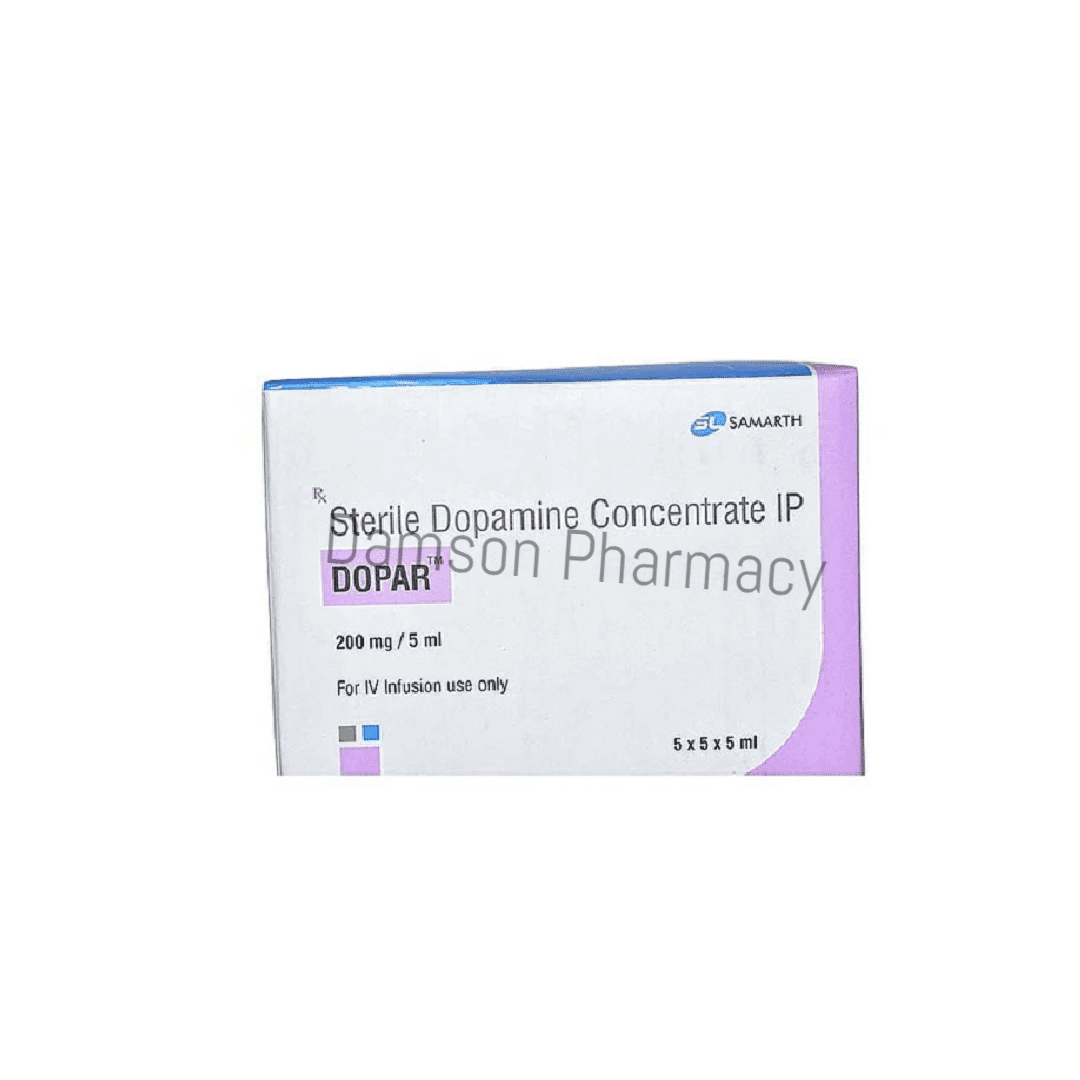
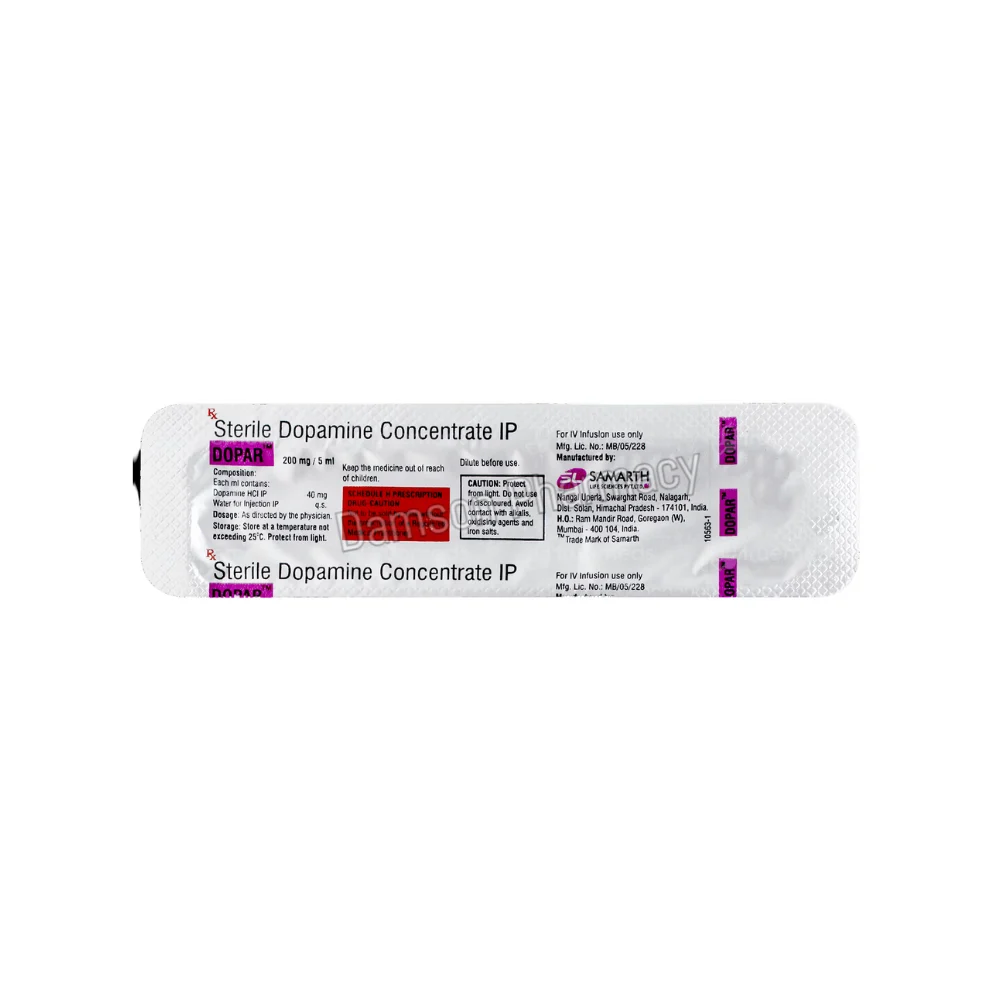
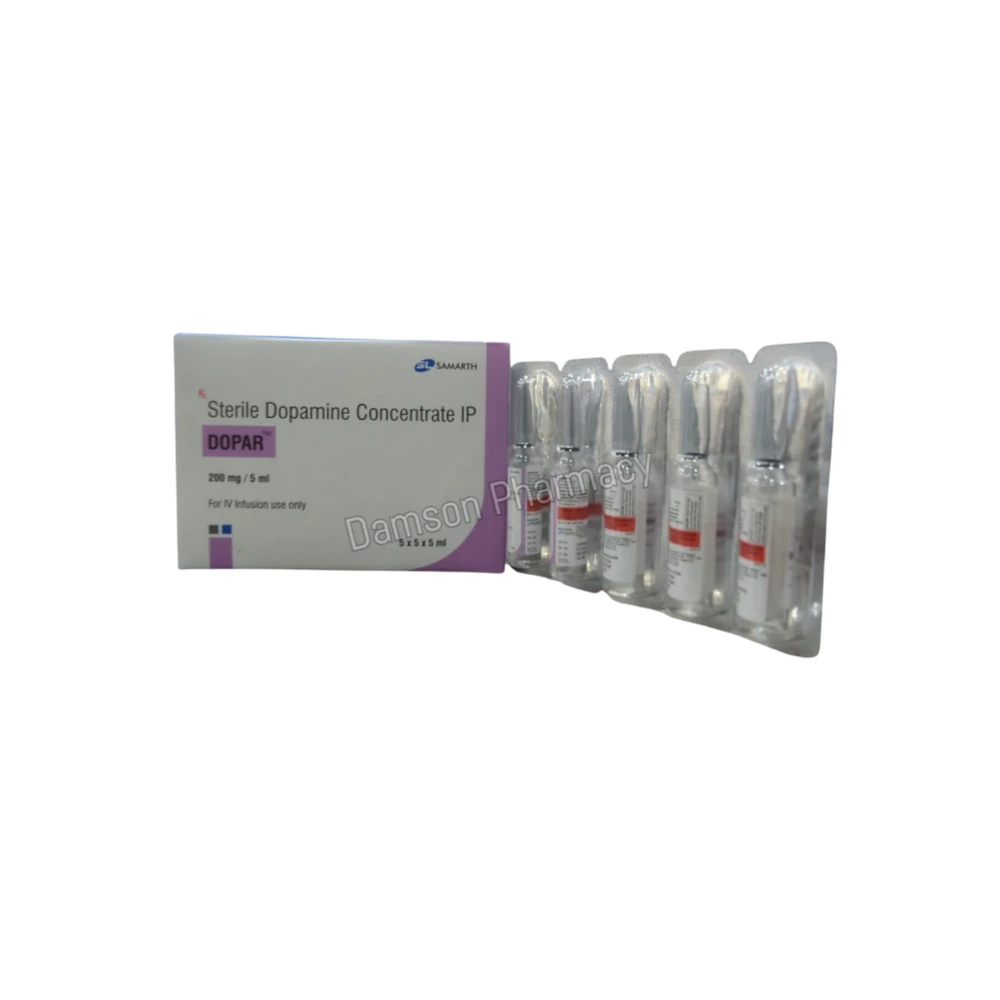
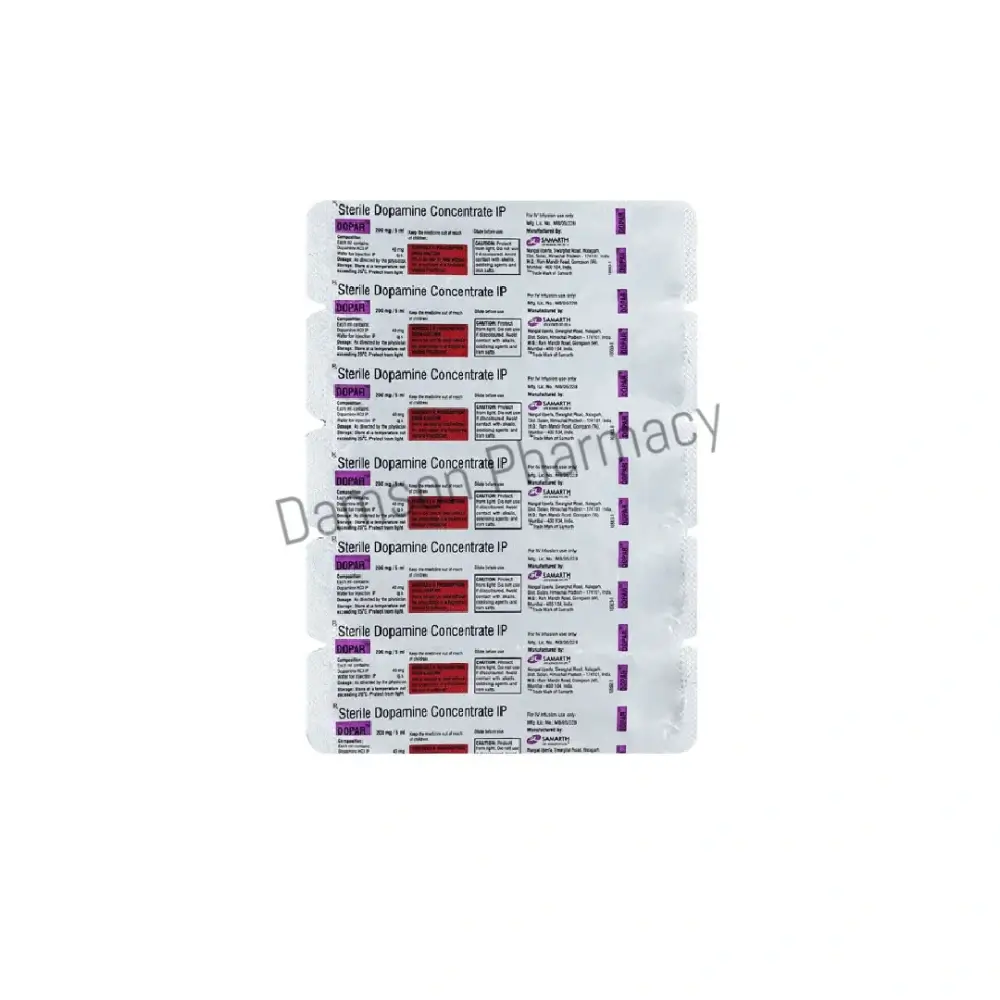

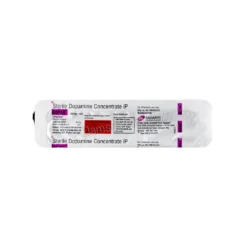
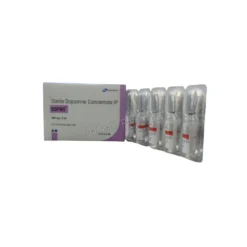
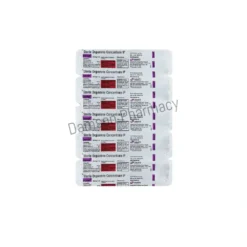
Reviews
There are no reviews yet.